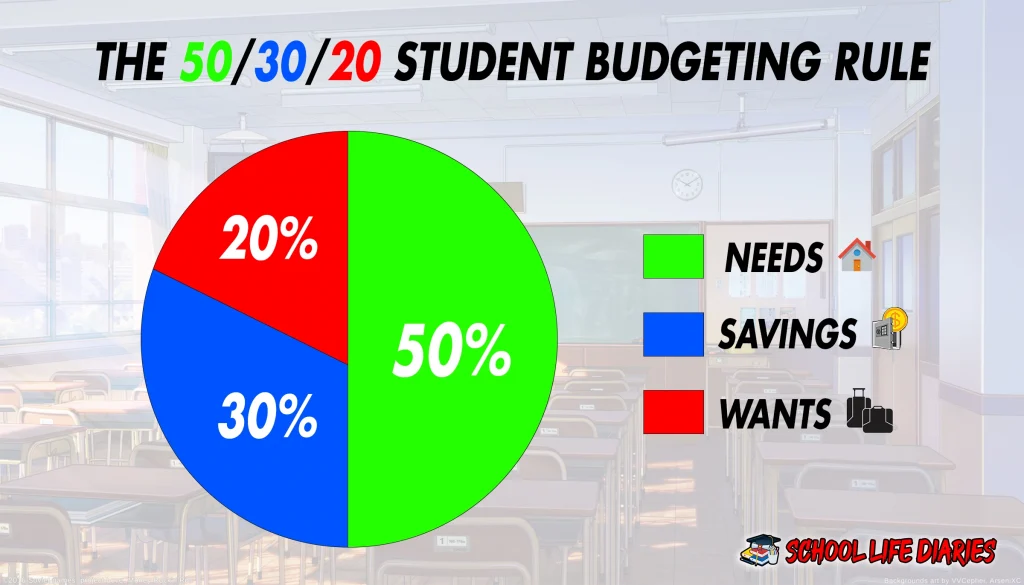College Student Budget can be a challenge, but it’s important to have a plan in place to make the most of your money. Here are a few tips to get you started:
Create a budget and track your expenses:
This will help you stay on track and identify where you can save money.
Cut back on unnecessary expenses:
There are likely a lot of things you can live without, like cable TV or eating out all the time.
Make use of student discounts:
Many businesses offer discounts to students, so be sure to take advantage of them whenever you can.
Find a part-time job:
A little extra income can go a long way when you’re trying to save money.
Start investing wisely:
Investing your money can help you grow your savings over time.
By following these tips, you can make budgeting in college a little bit easier and help ensure that you have enough money to cover your expenses.
How to Set Up a College Student Budget?
Step 1: Calculate your net income:
Your net income is the amount of money that you earn after taxes and other deductions have been taken out. To calculate your net income, add up all of your sources of income, such as wages, tips, scholarships, or any other type of funding. Then subtract any expenses such as student loan payments, housing costs, or any other monthly expenses that may impact your budget.
Step 2: List your monthly expenses:
Once you have an accurate estimate of your net income, it’s time to start tracking your spending. To do this, create a list of all of the monthly expenses that you will incur over the course of the school year, such as:
- Tuition
- Fees
- Textbooks
- Food
- Costs
- Transportation expenses
Step 3: Have a money talk with your family or friends:
Managing your finances on your own can be difficult, especially when you are dealing with all the stress that comes along with being a college student. That’s why it’s important to have an open and honest conversation with the people who are supporting you. Whether that’s your parents, other family members, or close friends. Talk to them about what they expect from you financially while you’re in college.
Step 4: Use a spreadsheet to list your income and expenses:
You’ll need to use a spreadsheet. A spreadsheet will help you keep track of your income and expenses, and it will also help you see where you can cut back on spending.
Step 5: Avoid eating fast food, which can be expensive and unhealthy:
You’ll need to avoid fast food. Fast food is often expensive and unhealthy, and it’s easy to overspend on it. If you’re not on a budget, cook your meals at home.
Step 6: Tools to create a college budget:
For a college student budget, you must use a tool like the College Board’s net price calculator. This tool will help you estimate your costs for tuition, room, and board, and other expenses. By using this tool, you can get a better idea of how much money you’ll need to budget for college.
Step 7: Review your scholarships and grants:
If you’ve been awarded scholarships or grants, review the terms and conditions to make sure you understand what is expected of you. Some scholarships and grants require that you maintain a certain GPA, while others may have service requirements. Make sure you are aware of all the requirements so that you can budget accordingly.
Step 8: Make any necessary adjustments:
If you need to make any adjustments, now is the time to do it. Make sure you let the financial aid office know of any changes so that they can make the necessary adjustments to your award.
Why Is a College Student Budget Important?
Creating and following a budget can help you save the most of your money and ensure that you’re able to afford the things you need.
Avoiding Unnecessary Expenses
One of the benefits of budgeting is that it can help you avoid unnecessary expenses. When you know how much money you have to work with, you’re less likely to spend impulsively on things you don’t really need. This can help you save money in the long run and make sure that your money is going towards things that are truly important to you.
Helping You Stay Healthy
When you have a budget, you’re more likely to make healthy choices with your money. This means that you’re less likely to spend money on unhealthy food or activities. Instead, you can use your money to support your health and well-being. This can help you feel better both physically and mentally.
Teaching You Valuable Life Skills
Budgeting can teach you valuable life skills. When you manage your money effectively, you’re learning how to make responsible decisions with your finances. This is a valuable skill that can help you in all aspects of your life. Not just with your finances. Budgeting can help you become more organized and efficient, and it can teach you how to better manage your time. All of these skills are important in both your personal and professional life.
Why Should I Create a College Student Budget?
There are many reasons why you should be budgeting your money, but here are just a few:
To stay on track with your finances
This is probably the most obvious reason for budgeting for students, but it’s also the most important. If you want to get ahead financially, you need to know where your money is going. A budget will help you do that.
- To save for a rainy day
Budgeting can help you make room in your spending so that you can start building up an emergency fund. This is money that you can tap into when unexpected expenses pop up or if you lose your job.
- To be able to afford life’s necessities
If you want to be able to pay your bills and put food on the table, you need to budget. This will help you make sure that your essential expenses are always covered.
- To avoid debt
One of the best things about budgeting is that it can help you avoid going into debt. When you know where your money is going, it’s easier to avoid overspending and racking up credit card bills.
- To save for retirement
If you want to retire someday, you need to start saving now. Budgeting can help you make room in your budget so that you can start contributing to a retirement account.
- To be able to take vacations
Vacations can be expensive, but they’re worth it. If you budget, you can make room in your spending for an annual trip.
- For emergencies
As we all know, life can be unpredictable. That’s why it’s important to have an emergency fund to cover unexpected expenses. If you budget, you can make sure that you always have money set aside for a rainy day.
- So you can feel in control of your money
A lot of people feel like they’re just treading water when it comes to their finances. If this is how you feel, budgeting can help. When you’re in control of your finances, you’ll feel more confident and empowered.
- To have financial peace of mind
This is probably the most important reason to budget. If you want to be able to sleep at night, you need to have a plan for your money. A budget will give you the peace of mind that comes with knowing that your finances are under control.
- Because frugality is the new black
In these tough economic times, more and more people are embracing frugality. And there’s nothing wrong with that! Budgeting can help you save money so that you can afford the things you really want and need.
Tips to Save Money and Stick to Budgeting in College
- Create a budget and stick to it.
- Cut back on eating out and buying groceries.
- Try to get a job on campus to help with expenses.
- Find ways to save on textbooks and other school supplies.
- Make use of student discounts whenever possible.
- Sell any unused belongings online or at a garage sale.
- Set aside money each month for savings and emergencies.
- Avoid racking up credit card debt by using them only for emergencies.
- Invest in a good-quality mattress and bedding to save on bed-related expenses.
- Consider living with roommates to reduce your living costs.
- Put money into a high-yield savings account or CD to earn some extra income.
- Make your own coffee instead of buying it every day from the café.
- Shop around for the best rates on car insurance, cell phone plans, and other services.
- Use public transportation or ride a bike whenever possible to save on gas money.
- Take advantage of free or discounted entertainment options on and around campus.
- Sign up for a rewards program with your favorite stores to get discounts and coupons.
- Purchase items in bulk when possible to save money on groceries and other items.
- Make a list before you go shopping to avoid buying unnecessary items.
- Compare prices online before making a purchase to ensure you are getting the best deal.
- Use cash instead of credit cards to help you stick to your budget.
- Invest in a good-quality backpack and school supplies to save on expenses in the long run.
- Do not buy new clothes every semester—shop at thrift stores or consignment shops instead.
- Take advantage of campus resources such as the library and computer lab instead of spending money on your own personal items.
- Do not get a car your first year of college – Walking, biking, or taking public transportation is much cheaper.
- Find scholarships and grants to help you pay for school instead of relying on student loans.
- Work part-time or full-time during the school year and summer break to earn extra income.
- Live at home with your parents or guardians to save on living expenses.
- Get a job in the dining hall or as a resident assistant to get free or discounted housing.
- When possible, purchase used textbooks instead of new ones.
- Avoid using your student ID to get discounts—many stores offer their own discounts for students without one.
- Wait until items go on sale before making a purchase—patience can save you a lot of money.
- If you do not plan on keeping them after the semester is over rent textbooks instead of purchasing them.
What Tools Can You Use to Create a Student Budgeting for College?
A money-saving app, Microsoft Excel, and Google Sheets are all great tools that can be used to create a college student budget.
Microsoft Excel
When it comes to creating a college student budget, Microsoft Excel is a great tool to use. Excel allows you to create complex formulas and track your budget over time. You can also use Excel to track your spending and find ways to save money on everyday items.
Google Sheets
Google Sheets is another great tool for college students who need to budget their money. Sheets allow you to collaborate with others on budgeting tasks.
Money-saving App
A money-saving app like Mint can also be a great tool for college students who need to budget their money. These apps can help you track your spending and find ways to save money on everyday items.
How Much Does the Average College Student Spend?
The average college student spends about $1,200 per year on textbooks and supplies, according to the College Board. But you don’t have to be a statistic. Here are some tips for how you can reduce the cost of your textbooks:
- Get your books early
Many campus bookstores will offer discounts of up to 25% off the list price if you buy your books early. And if you’re able to find your books used, you can save even more.
- Shop around
Don’t assume that your campus bookstore is the only place you can buy textbooks. There are a number of online retailers that sell textbooks, often at a significant discount. And if you’re willing to wait a few days for your book to arrive, you can usually find even better deals.
- Compare prices
When you’re shopping for textbooks, it’s important to compare prices. There are a number of websites that allow you to compare the prices of different retailers, so you can be sure you’re getting the best deal possible.
- Rent your books
If you’re only going to need a textbook for a semester, you may want to consider renting it instead of buying it. There are a number of websites that allow you to rent textbooks, and you can usually save a significant amount of money by doing so.
- Buy used books
One of the best ways to save money on textbooks is to buy them used. You can often find used textbooks for a fraction of the cost of new ones. And if you’re willing to wait a few days for your book to arrive, you can usually find even better deals.
What is the 50/20/30 Budget Rule?
The 50-20-30 budget rule is a guideline for how to divvy up your spending. The goal is to have 50% of your take-home pay go-to essentials, 20% towards savings, and 30% toward lifestyle choices.
How do you do the 50/20/30 College Student Budget Rule?
To do the 50/20/30 budget rule, you need to first decide on what percentage of your income you want to spend on needs, wants, and savings. In this case, let’s say that you want to spend 50% of your income on needs, 20% on wants, and 30% on savings.
After you have decided on your percentages, you need to figure out how much money you make each month. In this case, let’s say that you make $4,000 a month.
Now, take the $4,000 and divide it by the percentages that you decided on earlier. This will give you the amount of money that you can spend each month on needs ($2,000), wants ($800), and savings ($1,200).
How to Properly Track Your Spending? – Student Budgeting
- Track as you spend
One way to track your spending is to track it as you spend. This means that you are recording each purchase as you make it. This can be a good way to keep track of your budget as well as how much money you are spending on specific items.
- Track it after the fact
It is the way that you are not recording each purchase as you make it, but rather, compiling all of your purchases at the end of the month and then recording them. This can be a good way to get an idea of where your money went, and it can also help you to identify areas where you may have overspent.
- Track by store
This means that you are keeping track of how much money you are spending at each store. This can be a good way to find out where you are most likely overspending, and it can also help you to stay within your budget.
- Use a separate spending account
This is the most basic way to track your spending. By keeping all of your spending money in one place, it is easy to see how much you have left and how much you are spending.
- Track as you go:
The way to track your spending is to keep track of every purchase you make. This can be done by writing down each purchase in a notebook or by using a budgeting app on your phone.
- Automate the process:
If tracking your spending is too time-consuming, you can automate the process by using a budgeting app that will automatically update your budget based on your spending.
What Types of Income and Expenses Do College Students Typically Have?
Total Income:
The total income is the sum of all your monthly income. This includes money from your job, side hustles, investments, and any other sources. It’s important to know your total income so that you can make sure your expenses don’t exceed them.
Monthly Income:
Your monthly income is the money you receive each month from your job, side hustles, investments, and any other sources. This is important to know because it’s the money you have available to cover your expenses.
INCOME | |||
|---|---|---|---|
| PER MONTH | PER SEMESTER | PER ACADEMIC YEAR | |
| Job | $1,400 | $6,300 | $12,600 |
| Family Contribution | $111 | $500 | $1,000 |
| Grants/Scholarships | $556 | $2,500 | $5,000 |
| Loans | $778 | $3,500 | $7,000 |
| Savings | $0 | $0 | $0 |
| Misc. Income | $33 | $150 | $300 |
| Total Income | $2,878 | $12,950 | $25,900 |
Variable Expenses:
Variable expenses are those that fluctuate from month to months, such as food, gas, and entertainment. They can be difficult to budget for because you never know exactly how much you’ll need to spend. It’s important to track your variable expenses so that you can get a better idea of where your money is going.
VARIABLE EXPENSES | |||
| PER MONTH | PER SEMESTER | PER ACADEMIC YEAR | |
|---|---|---|---|
| Eating Out | $50 | $225 | $450 |
| Entertainment | $100 | $450 | $900 |
| Clothing | $50 | $225 | $450 |
| Cabs/Rideshare | $20 | $90 | $180 |
| Gym/Hobbies | $50 | $225 | $450 |
| Personal Grooming | $20 | $90 | $180 |
| Other | $20 | $90 | $180 |
| Total Variable Expenses | $310 | $1,395 | $2,790 |
Fixed Expenses:
Fixed expenses are those that stay the same each month, such as rent, insurance, and loan payments. They are easier to budget for because you know exactly how much you need to set aside each month. It’s important to pay your fixed expenses on time to avoid late fees and other penalties.
FIXED EXPENSES | |||
| PER MONTH | PER SEMESTER | PER ACADEMIC YEAR | |
|---|---|---|---|
| Tuition and Fees | $1,111 | $5,000 | $10,000 |
| Rent/Housing | $500 | $2,250 | $4,500 |
| Utilities | $200 | $900 | $1,800 |
| Cable/Internet | $35 | $158 | $315 |
| Laundry | $0 | $0 | $0 |
| Groceries/Meal Plan | $150 | $675 | $1,350 |
| Car Payment | $150 | $675 | $1,350 |
| Car Insurance and Registration | $200 | $900 | $1,800 |
| Gas/Transportation | $40 | $180 | $360 |
| Car Servicing | $22 | $99 | $198 |
| Monthly Parking | $0 | $0 | $0 |
| Credit Card Payments | $0 | $0 | $0 |
| Cell Phone Plan | $0 | $0 | $0 |
| Books and Supplies | $44 | $200 | $400 |
| Prescriptions and Medical Expenses | $15 | $68 | $135 |
| Other | $0 | $0 | $0 |
| Total Fixed Expenses | $2,467 | $11,105 | $22,208 |
Total Expenses for College Student Budget:
The total expense is the sum of all your monthly expenses, including your fixed and variable expenses. This is important to know so that you can make sure your income exceeds your expenses.
TOTAL EXPENSES | |||
| PER MONTH | PER SEMESTER | PER ACADEMIC YEAR | |
|---|---|---|---|
| Total Income | $2,878 | $12,950 | $25,900 |
| Total Expenses | $2,777 | $12,500 | $24,998 |
| Difference (Income – Expenses)* | $100 | $450 | $902 |
What Should a College Student Budget Include?
These are the few things that Student Budgeting includes:
- Tuition
- Room and Board
- Rent
- Food and Groceries
- Utilities and Phone Bills
- Transportation
- Textbooks and Supplies
- Entertainment
Conclusion – College Student Budget:
Now that you’ve read our complete guide to college student budgets, hopefully, you feel a little more prepared to manage your money while in school. Budgeting for students for college can be a difficult task, but it’s important to do it in order to make the most of your money. We offered a few best tips above for creating a college student budget that will help you stay on track.






